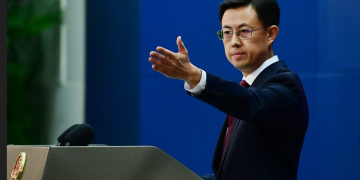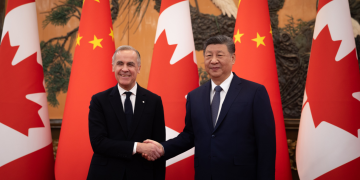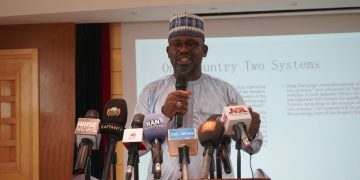Almost all Nigerians have listened to or watched many analysts express concerns over the perennial stealing of Nigeria’s crude oil and its attendant negative effects on the country’s economy. JOSHUA EGBODO writes on the emerging issues as the House of Representatives works on the 2023 budget.
A worrisome trend There is hardly any discussion in the polity today involving the economy the case of crude oil theft does not feature prominently. As it is today, there have been contradicting figures on how much crude oil is being stolen daily, and those behind the act.
While the issue continued, the seeming most controversial revelations surfaced through the Chief of Naval Staff, Vice Admiral Awwal Gambo, who during a national television interview, disputed earlier figures reported as daily volume of crude oil being stolen from Nigeria.
Minister of State for Petroleum Resources, Timipre Sylva, had stated that the country loses 400,000 barrels of crude oil daily to theft, a figure the CNS argued was unrealistic and rather outrageous.
He noted that oftentimes, differences were not made between oil theft and oil losses, stressing that one of the challenges “we face is the habit of disseminating unconfirmed and uncomplimentary statements, either due to misinformation or mischievous intentions regarding our operations.
“For example, there have been conflicting publications from various sources attributing oil losses to oil theft, which is blamed on inadequate security, casting aspersions on security agencies and all that.
“In as much as there is no perfect system, the phenomenon of crude oil theft and crude losses must be properly de-conflicted to proffer lasting solutions to the menace which is currently bedeviling our economic resources.
He continued, “We need to understand the difference between oil theft and oil loss. In this case, why oil theft is siphoning crude oil from vandalized pipes into badges? Oil losses occur when there is no production, especially during short-ins and force majeure, as the federal government does not earn the desired revenue it should.
“Losses also occur as a result of metering errors on the operating platforms as read. However, the volume of crude all shot in from ‘no production’ are often added to figures for oil theft instead of declaring them as oil losses which should not be.
“Some sources also claim that about 20,000 to 200,000 barrels per day are being considered as stolen. Most of these claims are outrageous and unrealistic”.
Leaders lament effects
Last Friday (October 7, 2022), when President Muhammadu Buhari laid before a joint session of the National Assembly, the N20.51 trillion budget estimates for the 2023 fiscal year, leaders involved; the President himself, Senate President, Ahmad Lawan, and Speaker of the House of Representatives, Femi Gbajabiamila, all had one thing sad to say about the perennial problem of crude oil theft.
President Buhari in his speech on the proposal which he tagged Budget of Fiscal Consolidation and Transition, disclosed that “Oil output stood at an average of 1.30 million barrels per day as of June 2022, while the sum of 1.59 trillion Naira was spent on fuel subsidy between January and June 2022”.
He pointed out, “The NNPC, working in collaboration with security and other relevant agencies, is putting in place additional measures to curb the incidence of pipeline vandalism and crude oil theft to meet our crude oil production quota”.
On his part, the Senate President said “our economy is still challenged by a dearth of revenues. The main source of revenue for the Nigerian Government is Oil and Gas. We always consider the diversification of the economy as crucial and it’s indeed crucial.
“The idea of deploying our revenues from the Oil and Gas to support the diversification into real sectors like Agriculture, Manufacturing, Mining, etc is now under serious threat. The large scale and massive stealing of our Oil, is concerning, as this reduces drastically the revenues available to the Government.
“With conflicting figures, projections have put our losses from this malaise at between 700,000 to 900,000 barrels of crude oil per day, leading to about 29 to 35 percent loss in Oil revenue in the first quarter of 2022. This represents an estimated total fall from N1.1 trillion recorded in the last quarter of 2021 to N790 billion in the first quarter of this year.
“The situation has worsened. Recently, the loss of our oil has reached 1 million barrels per day. Translated into monetary terms, our loss is monumental. The figures show we are not able to meet the OPEC daily quota of 1.8million barrels per day.
“Mr. President, I consider the Oil thieves the worst enemies of our country. The thieves have declared war on our Country and our people. I strongly feel that if we do not take the necessary measures to stop the thieves immediately, our economy will be devastated, as efforts to provide infrastructure and diversification of the economy would both be thwarted. It is time to take drastic and desperate measures against the thieves.
“Mr. President, the situation becomes more unfortunate if we factor in the Budget deficit estimated at N7 trillion and the grim prospect of its increase to about N11.30 trillion as presented in the 2023 – 2025 Medium Term Expenditure Framework / Fiscal Strategy Paper (MTEF/FSP)…”.
Before the budget presentation, Speaker of the House of Representatives, Femi Gbajabiamila had at a public function declared that crude oil thieves are not different from terrorists and bandits, with their destructive impact on the economy.
Rep’s panacea
Akin to presenting the collective position of his colleagues to President Buhari during the budget presentation, Speaker Gbajabiamila urged the President to treat the stealing of Nigeria’s crude oil as treason.
“Mr. President, permit me to convey the disquiet in the House of Representatives arising from the reports of a massive decline in the volume of crude oil exports due primarily to theft and diversion by criminal elements.
“The House of Representatives senses that those engaged in these activities are agents of economic sabotage determined to bring our country to its knees. Therefore, our position is that their actions constitute treason against our country, for which they and their enablers must be held accountable to the fullest extent permitted by law. Nigerians no longer want to hear about crude oil theft. The question has now become what are we doing about it?
“Therefore we are urging a swift and systemic overhaul of the systems in place to protect the country’s oil and gas resources. The arrangements in place are no longer adequate. As such, there is an obvious need for improvements to stop the loss of income occasioned by this ongoing sabotage”, he added, adding that this was more necessary at a time when the government was borrowing heavily to finance its operations.
A sudden booster?
With such calls from the House of Representatives, and besides other measures recommended, the Senate President had argued that the huge deficit in the budget can be reduced by stopping crude oil theft. “Your Excellency, we can reduce the deficit by stopping the theft”, he had submitted.
Others like the Labour Party’s presidential candidate for the 2023 general elections, Mr. Peter Obi that culprits should face the required punishment, there appeared to be a renewed seal with recent interceptions and discoveries.
For instance, a pipeline reportedly being used by the thieves to siphon crude oil for about nine years was just discovered a few days ago, and also the reported interception of a vessel by operatives of Tantita Security Services Limited (TSSL), a firm owned by ex-militant leader, Government Ekpemupolo, alias Tompolo.
The operatives were said to have ambushed and arrested eight suspected crude oil syndicate members while pumping crude oil from a Chevron Nigeria Limited (CNL) pipeline in Delta State into an improvised 87-meter-long vessel named MT Deino.
The question many are asking is whether the fresh call of the concerned leaders is catalyzing the renewed vigor, more as the House of Representatives, true to its promises last week, has commenced work on the 2023 budget estimates, with debate on its general principles.













































